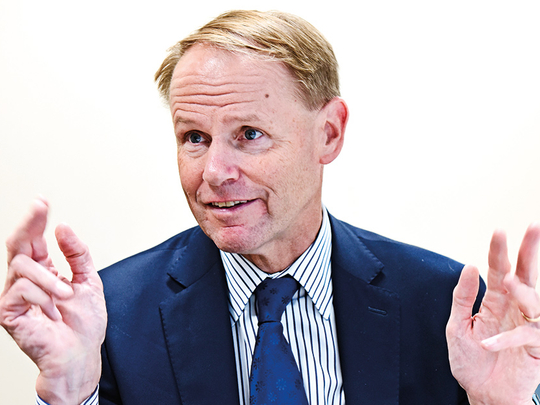
Dubai: Investment flow into passive funds will gain momentum in the long term because of its low cost, and the ability to give a diversified exposure, William F. Truscott, chief executive officer at Columbia Threadneedle told Gulf News in an interview.
The passive funds, which replicates the index funds, have been taking a larger share of savings, and has been gaining popularity with over a third of the assets in the US finding their way into these funds, compared to a fifth a decade ago.
In 2016, 84.6 per cent of the large-cap fund managers, and 87.8 per cent of the mid-cap fund managers, and 88.7 per cent managers underperformed the benchmark indices, amid a growing debate on the need to pay the fund managers an extra fee for their services. The figures were equally unfavourable for a 5 year or 10 year investment horizon.
“They [clients] are saying if you are not going to beat your index regularly, I’m not going to pay you a fee, I’m going to buy a passive fund product, so there is client demand there,” Truscott said.
Columbia Threadneedle, which has $460 billion (Dh1.6 trillion) of assets under management, however, said it may be a short term phenomenon because its easy for a passive fund to show decent returns in a bull market, but the same may not be the case when asset prices fall.
Consolidation
The increased flow of money into the passive funds, along with other factors like duplication of work in middle office, back office, trading system, sales force will lead to increased consolidation in the fund industry.
“There are 800 managers of mutual fund in the US alone. There are over 10,000 mutual funds in the US alone. Do we need so many mutual funds, and managers. the answer is we don’t. There will be consolidation, and there has been consolidation for the last 16 years. I predict that consolidation will likely increase overtime,” Truscott said.
“The bigger consolidation wave will come when markets get tougher or they fall,” he added.
And Columbia Threadneedle, which has made three acquisitions, will play a part in the consolidation story.
When asked about the asset managers next move on consolidation, Truscott said, adding “we have been a consolidator. We are very choosy, the price has to be right. We are price conscious.”
The consolidation along with the rise of Fintech companies will change the way mutual fund industry works.
Truscott said the biggest beneficiary of Fintech will be the research process along with the middle and back office work.
“The traditional job of an analyst is changing. We can essentially use big data to research companies. For us one of the beneficial impact for us would be that we would be able to gather the data very quickly. We think research analyst of the future would be very efficient in using data and data sets, and would be able to mine data. So the days of starting your day with a Lotus 123, Microsoft XL sheet will be gone,” he added.
However, the biggest hurdle for further growth of Fintech in fund industry will be regulators.
“The biggest hurdle for companies that would like to essentially do to financial services industry, what Uber has done to cab sharing, would be due to regulations. It’s a deeply regulated industry, fintech will have a natural barrier on how far it will go, and will be held back by regulations,” he added.
Focus on income
Columbia Threadneedle manages $59 million in the Gulf at wholesale level, and manage $10 billion from sovereign level or institutional level, and that may increase overtime.
Talking about expectations from his local clients, Truscott said “this region is similar to other parts of the world, people want yield for their money, people are looking for income.”
Columbia Threadneedle also runs a Sharia fund that invests in global equities, which is at the top of the Islamic Global Equity peer group, according to Morningstar. The fund has outperformed the MSCI Islamic series slightly.












